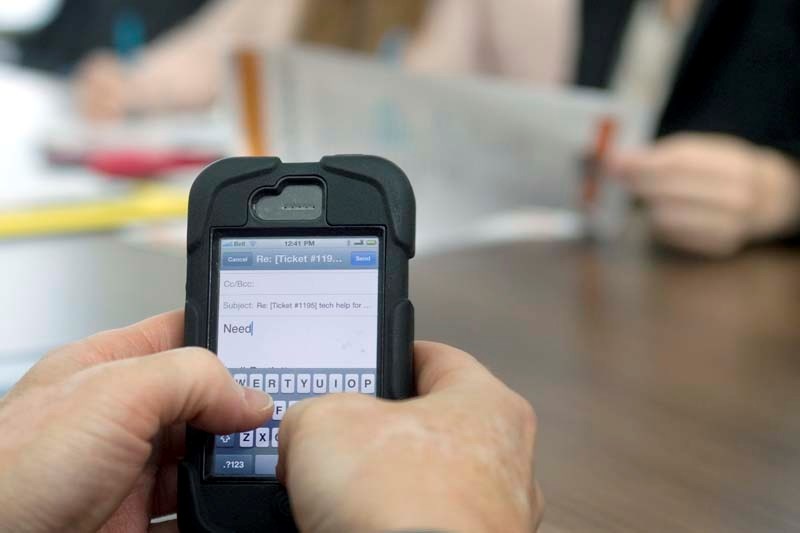Jim Hole learned an embarrassing lesson about cellphone manners one day.
Sitting in a meeting that required him to keep his phone turned off, his timer began to ring. Not only interrupting the conversation, the loud beeping noise also drew some uncomfortable looks. To his excuse, Hole said the phone turned itself on for the alarm and he usually keeps it on silent.
“On a regular basis I try to keep it on vibrate and nobody hears it and then I just ignore it (if it rings),” he said. “I just don’t like grabbing the phone when there are customers and you are talking to them.”
Good cellphone etiquette is a must in today’s business world, said Corey Poirier, a professional speaker and customer service trainer. Surprisingly enough, he said it’s often the CEOs he meets during his talks that take the time to turn off their phones and focus on him.
Poirier now incorporates that story into his lessons on business success and customer relationships. By saying no to your phone at certain times, he says people learn to focus on the task in front of them and will often be more successful in their jobs.
This rule not only applies to people in the highest ranks of business but to everyone from a store clerk to family members at the dinner table. If you stop checking your emails or refuse to text while dealing with other people in person, it sends out a powerful message about the value you place on others, he said.
“I think it’s important in the sense that they realize the power of focus, or being all in to whatever they are doing at the time,” he said. “And by doing that whether knowingly or unknowingly they are placing heavy value on the person in front of them.”
But proper cellphone etiquette is nothing that has been set in stone, said Mary Jane Copps, The Phone Lady. Nova Scotia-based Copps teaches communication methods to those looking to improve their conversation skills and customer relationships.
While there are general rules about keeping your phone turned off in the theatre, classroom or auditorium, there is no standard for business meetings, she said. As generation Y (people born between the 1980s and 2000s) moves up in the ranks, she expects the use of cellphones will grow significantly in both business settings and social life. It may be completely normal to use your phone in a meeting for Facebook or Google, she said, while the lines remain blurred at other companies.
What people should keep in mind is the power of distraction, she said. If your cellphone rings in a meeting and you are not prepared for the call, the person on the other phone will hear the disruption in your voice, she said.
“So you could be setting the wrong tone for a conversation without meaning to,” she said. “We also communicate that we are not listening to the people in the room either and they may interpret that as rude. It’s a bit of a box that we are putting ourselves into and I think we don’t have to.”
A call can be excused if it’s an emergency or the people in the meeting have been warned about it, she said. There are also times, she added where it’s useful if people tweet, email or text about a meeting if it helps getting the word about your company out.
That doesn’t mean that we shouldn’t turn it off, focus on the moment and have some downtime, she said.
“I think those people who are able to create some boundaries of their interaction with the phone in terms of conversations and email, they may be healthier and have less stress and better communication with their clients,” she said. “Because they are not always living inside their work.”
Hole said most people seem to know how to strike the right balance with their phone. Important meetings take a break after two hours to allow people to check their emails, he said, while there are also meetings with lighter agendas where it’s accepted to glance at your phone.
He added that most of his employees, especially the drivers and people working in retail, were asked to turn their phones off. He doesn’t mind employees working outside of customer service and in the greenhouse keeping their phones handy – in case he needs to reach them in a hurry.
“People in my experience are pretty respectful of cellphones and how they can be disruptive,” he said. “But we all make mistakes and I think we need to give each other a little latitude on that.”




